

InterviewwithRalph TeebyHBH |
|
|
|
|
|
|
|
First contact with music was at home listening to Ella Fitzgerald
records from the age of 10! Played music through my teens, had a trad jazz
band in which I played trombone and sometimes keyboards. Later played keyboards with a UK Brit Funk group Touchdown (who had a hit with "Ease Your Mind"). Started to DJ in 1975 playing soul, and jazz fusion with an emphasis on funk jazz artists like The Crusaders, Eddie Russ, Donald Byrd, Ramsey Lewis, Dennis Coffey etc etc. Loved anything produced by Wayne Henderson's At Home productions - with "Friends & Strangers" by Ronnie Laws still being my best jazz funk album of all time. In 1978 I was totally overwhelmed by Roy Ayers and Carla Vaughn on their "You Send Me" tour and have been a huge fan of Roy's ever since. When I began compiling albums for labels, did FIVE on Roy Ayers - Rare 1/2/3 and "Shining Symbol" + "Get On Up Get On Down" collections all for Polydor.  Also a fan of Rodney Franklin, so made sure the best of his work was released by Columbia on a best of CD recently! (Compiled with sleeve notes by yours truly) DJ'd at "The Bass Clef" in Hoxton Sq "Fusion" night before club became The Blue Note, and also had a weekly three hour show on London's Jazz FM (I still do shows for the station). Had a soul/jazz fanzine "Groove Weekly" from 1980-1982 where I was editor, publisher and main contributor! Later became Assistant Editor of Blues & Soul magazine and Editor of both "Mix Mag" and "The Street Scene" where contributors included Gilles Peterson and Richard Searling. First record company job was at Arista in 1987 and was part of the team responsible for breaking Kenny G into the UK market with "Songbird". Also worked with Patrice Rushen and Kashif at the label (among others). Also responsible for some re-issues on artists like Phyllis Hyman, Bobby Womack and Don Blackman. 1989 became involved in Expansion Records which I run to this day. Label focus mainly soul in the early days, but now work with a lot of smooth jazz artists and vocalists. |
|
|
|
|
I co-own Expansion Records with Richard Searling. We have been joint
partners since 1990, though I handle all day to day operations. Richard is based in Manchester and has more of an ambassador role. He is the most influential northern soul and modern soul DJ in the UK, if not the world. He is also a promoter and DJ on Jazz FM in the North West of England. 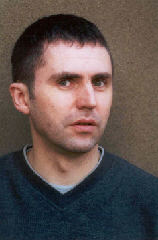 I work from the London office of Expansion at 81, Crabtree Lane in London and consider myself as Managing Director. While Richard and I make joint a&r decisions, I handle everything to do with artist contracts, design & artwork, manufacturing, distribution, marketing, press and promotion. Everything except accounts and administration which is handled by Passion Music Ltd. This comprises my daily work, on top of which I also do the same and make ALL a&r decisions for the Passion Jazz label. Passion Jazz is owned by Passion Music Ltd (company responsible for Shakatak, which it created) and I work for them as a consultant. |
|
|
|
|
No two methods are ever the same. Each project has its own set of
individual circumstances. In some cases a CD from the USA may appear on a small label that has no distribution. In this situation we simply contact them to try and acquire UK licensing rights. Other times we may be contacted by an artist who has a finished album but with no means of release. Then, from time to tome, we may make our own 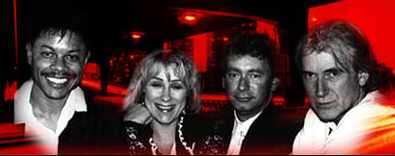 albums - especially for Passion
Jazz with its connections with Shakatak. From this one group we
have created individual albums by Bill Sharpe, Jill Saward, Roger
Odell (Beatifik), Fridrik Karlsson (guest guitarist) and Espirito
(Bill Sharpe and Fridrik Karlsson together). albums - especially for Passion
Jazz with its connections with Shakatak. From this one group we
have created individual albums by Bill Sharpe, Jill Saward, Roger
Odell (Beatifik), Fridrik Karlsson (guest guitarist) and Espirito
(Bill Sharpe and Fridrik Karlsson together).Then, through a decade of working with UK artists, I created The Jazz Steppers through an association with Pat Leacock who had a group Zaeus I recorded in the early 90s. This group won the MOBO award for 'Best Jazz Act' two years ago, and all the guys are top musicians who have played live with people like Roy Ayers and Don Blackman. Bass player Dean Mark is also a key part of Craig David's band. NiteFlyte are a group I created from the ashes of Act Of Faith, whose album "Release Yourself" is one of my favourite all time Expansion albums. Tony Campbell was originally signed to Talkin' Loud in a group Perception, but I had seen Act Of Faith perform around London for about two years and were completely hooked on them. When the lead singer left, an instrumental collaboration was too irresistible and "4am" became an instant smooth jazz radio hit. Long standing associations with people in the business also account for many on-going releases. Through an initial Expansion singles deal for an artist Aja (produced by Brian Jackson who also worked with Will Downing) I got to do the Kashif album project. Through that I got to do Craig T. Cooper. Through time, the same managers, lawyers, studios appear and through building great relationships we have had access to some wonderful music. There are also other fans of this music who look after us and put great music our way. This could be anyone from Steve Quirk, head of music at Jazz FM, to Mike Ward in Sheffield who trawls the Internet looking for individual artist sites or any word of forthcoming projects that look interesting. Our friend Andreas in Holland is also a big supporter of our label and goes to great lengths to find us interesting new music. He is also invaluable in tracking down elusive artists with whom we have had desires to represent. We are lucky to have people like this around us However, we still don't get everything we want. For example the T.C. Carson album on his own label (available only via his website) would be perfect for our label and would be extremely appreciated by our core audience. We have contacted him several times but without a response, so we can only assume he is not interested. |
|
|
|
|
I think there is plenty of this music available, but the quality is
harder to find. The full appreciate of smooth jazz is an acquired taste,
and I believe the difference between regular 'background music' and what I
consider the finer end of smooth jazz can be very subtle. We are offered a considerable amount of smooth jazz, and there are many projects I could spend time chasing for the label. However much of it lacks the 'soul' or simply an 'x factor' that simply makes it worthwhile for me. 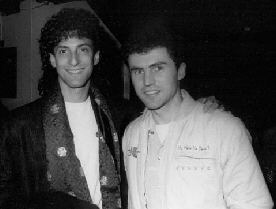 Of course the problem is that not everybody has the same taste, so music that I choose to champion is not always desirable to everyone else. However, I have very clear opinions on what works and what doesn't and I very much stand by these when releasing a record. I hate it when people say that all smooth jazz sounds the same, but at the same time I understand it because I have similar feelings about aspects of rock and dance music that least interests me. Unfortunately, a lot of it does sound the same and it's not always the albums that do have something special that do get the sales. For example, I think Bobby Lyle's set "The Power Of Touch" is one of the best ever albums in this genre, though it sold very little and Bobby is out of his deal with Atlantic. Then there are other albums far less special that do very well, so as a record label it is very hard to judge how an album will perform - especially if it is reliant on the hit and miss of smooth jazz radio. So yes, there is plenty out there but the quality is often questionable.
|
|
|
|
|
If I am sent a CDR, or finished CD, I will generally listen to this the
same day. My first impressions are generally right, so if I don't respond
straight away it's probably because I am not impressed. Tapes are harder
to listen to, and there is always too much to listen too. I often feel that everyday I only hear new music and rarely get to hear what I already know and truly love! Most of what I listen to is disappointing, and the projects that excite me the most come recommended by other people. |
|
|
|
|
I enjoy going to live events, but rarely with a view to sign acts. How acts sound on stage is often very different to the way they come across on record. Smooth jazz requires a particular style of production, and some touring acts sound to 'live'. 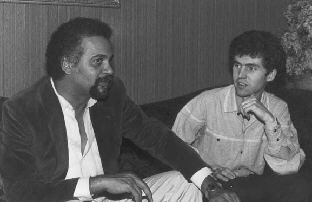 The other problem I have as a small label is that I cannot afford to speculate too much. I very rarely take a chance on putting a live act into the studio. This is because I cannot afford the liability of a disaster! I tend to work with acts who at least have gone some way to recording tracks on their own. For me, if there is at least one recording that is finished, and that I truly love, I may well take a chance on paying for a full album as long as it makes financial sense. |
|
|
|
|
In the UK I believe we are at least as active, if not more active than
the majors. In many cases, the UK majors simply inherit titles signed by their American counterparts, and in a lot of cases great albums are never actually released over here. They are confined as imports. Sony Jazz and Universal get some good work done with their American signed artists, but unlike us it is rare for smooth jazz to be specifically signed by majors for the UK. Of course the main difference of all is finance. Major labels can afford to spend what they want and often have agendas attached to what they release, and what they don't. They can afford to take a loss in the UK to justify a show of faith, especially if these albums have already made money in America. Therefore, when they chose, majors can spend much more on marketing than we can. Unfortunately we do not have this luxury, and have release has to have the potential to at least break even, and hopefully make some money! Regrettably, the UK is a very small market for this music where marketing opportunities are not very cost effective. However, we still have many benefits. As a small company we can be more flexible with our release dates, more focussed on each release, and through ten years in business have built up a network of enthusiastic DJs, journalists, wholesalers and retailers who are supportive of all that we do. |
|
|
|
|
Promotion and marketing strategies vary depending on the strength of
the album and the existing profile of the album. Naturally radio promotion is important, though we are limited in the UK to Jazz FM and a couple of Internet stations which may play the vocal tracks. Jazz FM are a real hit or miss with our music. They may support one CD (like Noel Elmowy for example), but won't touch another (like Citrus Sun) - 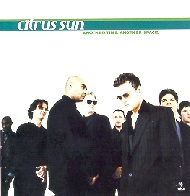 and
we never know in advance which way it will go. This can be frustrating but
is the nature of the business. and
we never know in advance which way it will go. This can be frustrating but
is the nature of the business.The main focus of our attention is retail, as obviously if you can't get the CD into stores people won't be able to buy it. We have a more subtle approach which has less to do with a blaze of high profile uneconomical advertising campaigns, but more to do with sustaining and building relationships with key wholesalers and retailers who support this music. However, press is important so we are in touch with key journalists and publications relevant to this music - and we do advertise consistently. This is not so much on a product by product basis, but on label awareness raising exercises constantly throughout the year. If we can can a live appearance in the UK by an artist, so much the better, though again finances are an issue and there are a lot of false economy situations with putting on live shows to sell extra CDs. It's a very delicate balance! |
|
|
|
|
There is no quick solution to this problem. The market is small because I believe that primarily the music does not appeal to young people. It's main market is over 35s who will buy, for example, a Bob James album today because they've bought his music all their lives. I know I do. I don't think the music is attracting many new people who have never heard or been interested in the soul and jazz fusion classics of yesteryear. Fundamentally, today's music industry is driven by marketing and labels do not sign smooth jazz acts because they look good in magazines or on posters. The music also has no sex appeal and is not in the least bit trendy. A formula to solve this problem is hard to find, though it is clear that when there is a dance floor dimension to the music it will do much better. Down To The Bone sold 135,000 "Staten Island Groove" in America because it was a good club track. Radio hit ballads and mid tempos could never expect to do so well. I think only Kenny G's "Songbird" is a major exception, and I helped promote that myself when I worked with Kenny at Arista. For me, at least one vocal track per album can at practically double sales on a smooth jazz 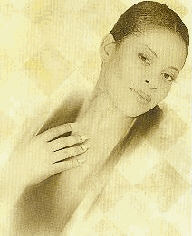 album because you then get soul fans interested -
especially if it is a good track and by a leading name like a Howard
Hewett, Phil Perry, Maysa Leak or Jeffrey Osborne. album because you then get soul fans interested -
especially if it is a good track and by a leading name like a Howard
Hewett, Phil Perry, Maysa Leak or Jeffrey Osborne.If there were more live events, then younger people may be drawn into the music, but in the UK at least there are no venues that would financially support anything other than established acts or those with a very big record at a particular time. Ultimately, our hope is that younger people will wake up and realise the poor quality of pop music they are being force fed every day. If this happens they may discover other music for themselves, and hopefully some will enter our enriched world of soul and jazz |
|
|
|
I think most instrumental smooth jazz artists recognise that a vocal
track or two on their albums is an advantage. This is why they do it, I'm
sure. Even Joe Sample as Howard Hewett lined up for his next
album.
From my own experience with Inner Shade and Citrus Sun on Expansion, Inner Shade sold many more copies through guest appearances from Maysa. I also know Citrus Sun would have sold many more if it had at least one vocal song. I think the adult soul scene also looks to smooth jazz releases for the best vocal songs just now. Full vocal albums tend to try and be too urban and put many people off. For example, I think Jeffrey Osborne's appearance on Bill Sharpe's jazz album is better than anything on Jeffrey's own solo album. |
|
|
|
|
My background and experience is not in promoting gigs. When I am not
running Passion Jazz or Expansion, I run Soul Brother's
re-issue label and a handful of others owned by Passion Music. So
my workload is cut out as an a&r/labels manager. We recently had Chris Standring, Fridrik Karlsson and Cathi Ogden all play at London's Dingwalls, but these events are staged by promoters I know with expertise in this area. Obviously we work together, but ultimately I don't get involved in the live side. The most successful smooth jazz live events in the UK are promoted by Jazz FM - but they have the advantage of broadcasting as many free adverts and DJ endorsements as they like. This is a false economy for an independent like me who would have to pay the going rate for adverts without any guarantee of DJ support. Smooth jazz is an extremely small and tough market in the UK and both record buyers and concert goers are lethargic. |
|
|
|
|
The releases on Passion Jazz are a combination of albums
licensed from overseas, and albums we have recorded ourselves. The 'Best
Of' compilation was designed to reflect the best from albums we have made
ourselves. I thought this would be more reflective of actual creative
achievements. In the case of Johann Asmundsson, he is one of the artists on our roster loosely affiliated with Passion's twenty year old act, Shakatak! In fact Passion Music as a company is built largely on the success of Shakatak with Polydor in the 80s. Nigel Wright, as member and producer of Shakatak is a co-founder of Passion and a co-owner and director through to this day. While Shakatak have recorded and t 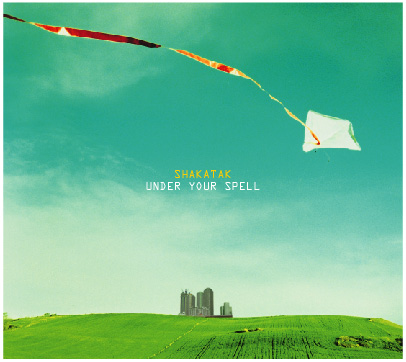 oured
internationally over the years, their most recent domestic product has
been released on their own label, through Passion, Inside Out.
In fact we are just about to release a brand new album "Under
Your Spell". oured
internationally over the years, their most recent domestic product has
been released on their own label, through Passion, Inside Out.
In fact we are just about to release a brand new album "Under
Your Spell".With Passion Jazz, individual members of Shakatak have an opportunity to record solo projects and to date we have albums on Bill Sharpe, Jill Saward, and Roger Odell (aka Beatifik). The connection with Johann is through guitarist Fridrik Karlsson, who has recorded and worked with Shakatak since Keith Winter has been unable to perform. Fridrik, who also has an excellent album with Passion Jazz, is an original member of Mezzoforte, and Johann Asmundsson is Mezzoforte's bass player. Johann's album is now finished and is called "So Low", but I have not actually met him yet as he lives and records in Iceland. |
|
|
|
In the early 90s I had a label called E-Zee which specialised in
what the time was called 'UK Street Soul'. One of the acts I became
interested in was 'Zaeus', a group that had sent me some of their
songs for consideration. Among the tracks where some instrumentals which I
used not only as bonus cuts on the single, but as part of a series of 'Street
Jazz' compilations I was also working on at a time. Pat Leacock was
integral to Zaeus and my main contact, so when I started Passion
Jazz I contacted him again with a few of doing an instrumental Zaeus
album.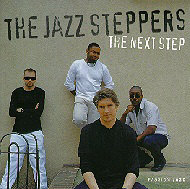 Unfortunately that group had split up, but Pat had some other musicians he was working with so I hooked up with them. When the album was delivered they called it "Jazz Steppin'", but they had no name for the group. I suggested we call the album after one of the tracks ("Get Up!"), and call the group The Jazz Steppers. That's how it started. Tony Campbell was someone I first met back in the late 80s when he and his group Act Of Faith used to perform live around London. They released a dance single called "Free", but when I spoke to Tony and group member Nik Jameson, I found out that they had many more songs recorded that had a street soul feel, much like Zaeus. We released a single called "The Whole Thing" on my E-Zee label, and had a small club hit. It was also playlisted on Kiss FM and major labels became interested in this very talented group. (Tony had previously also recorded with a group called Perception, briefly signed to Talkin' Loud). Soon after Act Of Faith signed with Island Records and released a very nice album, but suffered from internal politics at the label. Next they recorded a new album for my Expansion label, but by the time it came out they lost their lead singer - who had become more interested in drum and bass. A few years later Jazz FM adopted street jazz as a genre and started playing records by groups like Down To The Bone. I suggested to Tony that we do an instrumental style Act Of Faith album, but come up with a new name for the group. This is how Nite Flyte was born, and we are now recording our third album. While making the second album, I thought it would be a good idea to include a vocal track for reasons already expressed earlier in this interview. Cathi Ogden was someone I had recently met and was an established Australian artist looking to hook into the jazz scene in the UK. I felt Nite Flyte and Cathi could help each other out here, so a recording session was arranged from which came "Company" - one of the most played tracks on Jazz FM that year. From this success, it seemed obvious to let Tony and Cathi work together for Cathi's own album which they did over twelve months. |
|
|
|
| The next Passion Jazz release is
"So Low" by Johann Asmundsson which will be
followed I would imagine by the next Nite Flyte album (with other
projects still in the negotiating stage). However there are new smooth
jazz projects due on Expansion too with sets by Bob Baldwin and
Craig T. Cooper being the next in line. I am also looking forward
to new sets from Maysa and Inner Shade either late this
year, or the early part of 2002. I also meant to mention that I have a new smooth jazz album by Leon Ware and Don Grusin called "Candlelight" on Expansion. |
|
|
|